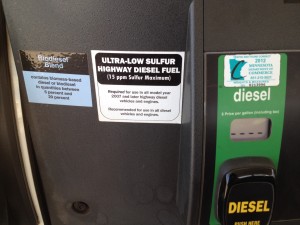Minnesota doubles down on nation’s top biodiesel law

OUT FRONT OR OUT ON A LIMB? MN instituted the nation’s first 10 percent biodiesel mandate this month, but exempted several key industries from compliance.
By Tom Steward | Watchdog Minnesota
Fill it up with diesel fuel. Just do it in Fargo, Sioux Falls, Eau Claire — or any truck stop across the Minnesota border.
That’s the road map for fueling 90 big rigs operated by Kottke Trucking, the result of plan driven by a state biodiesel B10 rule, which the Minnesota company calls “unfair, expensive and wrong.”
Minnesota became the first state to require every gallon of diesel contain at least 10 percent biodiesel — produced mostly with homegrown soybeans — as of July 1.
“We tell our trucks to stay outside of Minnesota as often as possible for pricing,” said Kurt Kottke, general manager of Kottke Trucking. “We buy cheaper outside of Minnesota. And, second of all, we don’t have to deal with the hassles that come with biodiesel and the issues that they bring us during the colder four to six months of the year.”
The Buffalo Lake trucking company estimates avoiding Minnesota’s biodiesel blend saves 4- or 5-cents per gallon on average, adding up to as much as $50,000 a year.
“The fact that we’re mandated to use it up here just takes us local truckers and makes us the guinea pig,” said Kottke. “We compete against nationwide firms and they boycott it (biodiesel). So in order to stay competitive, we’re price conscious. It’s just that simple.”
As Minnesota doubles down on its previous B5 mandate, service stations will be required to sell the higher blend to all motorists from April through September. In colder months, the product at the pump reverts to B5 — to avoid gelling and other issues related to winter conditions.
The increased state biodiesel mandate follows the expiration of a $1 per gallon federal tax credit. B10 will boost biodiesel usage an estimated 50 percent — 20 million gallons — and bolster the $900 million state biodiesel industry. State agriculture officials estimate the renewable requirement adds about 70 cents to the price per bushel for soybean growers, who successfully lobbied the 2014 Minnesota Legislature to approve the increase.
“I’m very pleased that common sense is still alive and well and that our legislators voted for what was good for Minnesota,” said George Goblish, president of the Minnesota Soybean Growers Association in a news release. “The decision to continue moving forward is good for air quality in Minnesota, energy diversity, and its good for the economy.”
The rule was supposed to be implemented in 2012, but a variety of issues with the evolving biofuel’s production and performance, particularly in cold weather, put on the brakes — until now.
“There’s no technical reason for concern, but this is a change, and so time will tell,” said Douglas Root, a senior scientist who tests biofuels at the Agricultural Utilization Research Institute. “Fuel performance is really important to school buses and the trucking industry, but there’s nothing in the technology that says this should be a problem.”
Kane Transport, a central Minnesota firm with a fleet of 125 trucks, even uses a 20 percent biodiesel blend several months a year.
“We currently run a lot of B20 in our trucks and have during the summer months for about the last nine years with no problems,” said Greg Graves, sales manager for transportation of renewable fuels at Kane Transport. “Pricewise, I guess it depends on where and how they buy it. But in most of the Minnesota terminals now, B10 is priced comparatively to B0 as I see it.”
Several industries continue to be exempted, however, based on what a legislative summary calls the “suitability of biofuel-blended fuels for their vehicles.” The Minnesota Commercial Railway, for example, said the mistaken use of biodiesel caused several locomotive engines to seize up, at a cost of $185,000. The U.S. Coast Guard wrote to Minnesota Attorney general Lori Swanson to express concerns about jeopardizing “operational readiness and the Coast Guard’s ability to fulfill its mission.” Representatives of Great Lakes carriers also requested exemptions, noting that foreign-flagged vessels and cruise ships do not refuel in Duluth due to concerns about the mandate.
Legislators sidestepped the Minnesota Commissioner of Agriculture’s recommendation to let nuclear power plants and U.S. Coast Guard vessels off the hook, also giving a pass to railroad locomotives and off-road logging and mining equipment. But there was no such break for hundreds of trucking companies and their drivers.
“Because the trucking industry is interstate, we want a universal, standardized fuel everywhere we go in the United States,” said John Hausladen, president of the Minnesota Trucking Association. “If that includes biodiesel, we would be fine because it takes care of the pricing inequities. And it would ensure it works everywhere, all the time, if it was nationally done. But when you have states do unique things, you create unique problems.”
Truckers also maintain they deserve most of the credit for significantly reduced emissions resulting from expensive new engines and exhaust systems in many vehicles.
Next stop for biodiesel in Minnesota? B20, coming to a filling station near you in 2018.







